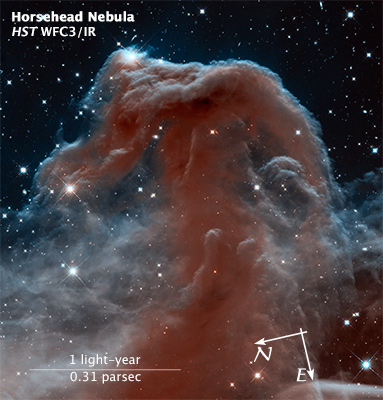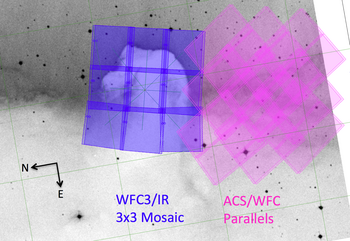|
To commemorate HST's 23rd anniversary, the Hubble Heritage Team has observed the famous Horsehead
Nebula with HST's new WFC3 infrared camera. This new view of the Horsehead is stikingly
different than the familiar view in visible light, revealing structures hidden by the dense dust
and gas. This image complements the 2001
Hubble Heritage image obtained with the WFPC2 camera.
The new WFC3 observations (blue squares, 2nd image on right) were obtained in October/November
2012 and include 9 tiles in a 3x3 mosaic pattern, where a small shift between tiles allows for
the removal of detector artifacts.
(See Proposal
12812, PI: Levay for details.)
The broad band F110W (YJ) and F160W (H) filters highlight unique physical processes occuring in
and around the nebula, and they combine to produce a dramatic new color image.
Parallel observations with the ACS Wide Field Channel (pink squares, 2nd image on right) have also
been obtained to create an H-alpha mosaic of the "horizon" feature adjacent to the Horsehead.
High level products for this dataset will be released soon. Ultimately, these new images will be
combined with the existing WFPC2 images to create an extended mosaic.
Since the Horsehead Nebula mosaics represent a significant investment of expert processing
beyond the standard archival products, these drizzle-combined FITS images have now been released
as a High-Level Science Product (HLSP) via the B. Mikulski Archive for Space Telescopes (MAST).
We provide a list of downloadable FITS files and preview GIF images. The associated
configuration
(cfg) files list the parameters used to combine the individual frames using HST's new
AstroDrizzle software.
Both the drizzled science (sci) and weight (wht) images are available. The later provide an
effective exposure time map for each filter.
Filenames follow the naming convention:
hlsp_heritage_hst_wfc3-ir_horsehead_fffff_v1_drz-ttt.fits
- fffff - filter (f110w or f160w)
- ttt - the file type:
- science (sci)
- weight (wht)
- drizzle configuration (cfg)
|








 Follow Us
Follow Us